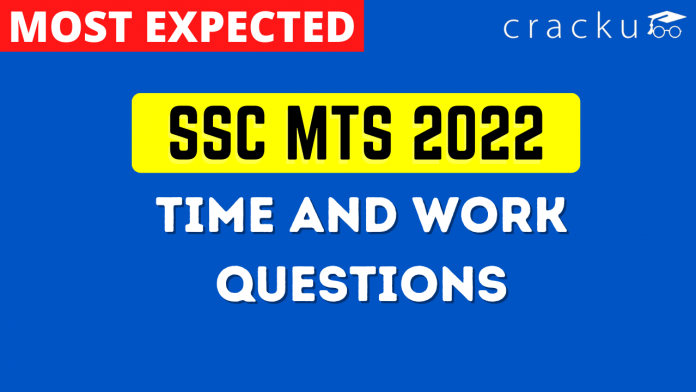Time and Work Questions for SSC MTS
Here you can download the Time and Work Questions for SSC MTS PDF with solutions by Cracku. These are the most important Time and Work questions PDF prepared by various sources also based on previous year’s papers. Utilize this PDF for Time and Work for SSC MTS. You can find a list of Time and Work in this PDF which help you to test yourself and practice. So you can click on the below link to download the PDF for reference and do more practice.
Download Time and Work Questions for SSC MTS
Enroll to 15 SSC MTS 2022 Mocks At Just Rs. 149
Question 1: Ten men or twelve women can finish the same workin 10 days. If 5 men and 2 women undertake the work together, how many days will they take to complete the work?
a) 15
b) 40
c) 20
d) 60
1) Answer (A)
Solution:
Total work = time $\times$ (men + women)
Ten men or twelve women can finish the same workin 10 days so,
$10m \times 10 = 12w \times 10$
5m = 6w
Let time taken to complete same work by 5 men and 2 women be d days.
Total work done by 5 men and 2 women = (5m + 2w) $\times$ d
12w $\times 10$ = (6w + 2w) $\times$ d
d = 120/8 = 15 days
$\therefore$ They will completed the same work in 15 days.
Question 2: Two cars A and B leave Delhi at 8:30 a.m. and at 9 a.m. for Shimla, respectively. They travel at the speeds of 40km/h and 50 km/h respectively. How many kilometres away from Delhi will the two cars be together?
a) 45 km
b) 100 km
c) 200 km
d) 5 km
2) Answer (B)
Solution:
Cars A and B leave Delhi at 8:30 a.m. and at 9 a.m. for Shimla, respectively so,
Distance traveled by car A in 30 min = speed $\times times = 40 \times 1/2 = 20 km
(30 min = 30/60 hr = 1/2 hr)
Relative speed of car B = 50 – 40 = 10 km/hr
Time taken by car B to cover 20 km = 20/10 = 2 hr
(Time = distance/speed)
Distance covered in 2 hr = 50 \times 2 = 100 km
$\therefore$ 100 kilometers away from Delhi will the two cars be together.
Question 3: A and B, working together, can complete a work in d days. Working alone, A takes (8 + d) days and B takes (18 + d) days to complete the same work. A works for 4 days. The remaining work will be completed by B alone, in:
a) 24 days
b) 16 days
c) 18 days
d) 20 days
3) Answer (A)
Solution:
To find the time when A and B, working together = $\sqrt{more days taken by A \times more days taken by B}$
d = $\sqr{8 \times 18}$ = 12
Time taken by A to complete the work = (8 + d) = 8 + 12 = 20
Time taken by B to complete the work = (18 + d) = 18 + 12 = 30
Let the total work be 60.
(LCM of 20 and 30 is 60.)
Efficiency of A = 60/20 = 3
Efficiency of B = 60/30 = 2
Work done by A in 4 days = efficiency $\times time = 3 \times 4 = 12$
Remaining work = 60 – 12 = 48
Time taken by B to complete the remaining work = 48/2 = 24 days
$\therefore$ The remaining work will be completed by B alone, in 24 days.
Question 4: The time taken by a boat to travel 13 km downstream is the same as time taken by it to travel 7 km upstream. If the speed of the stream is 3 km/h, then how much time (in hours) will it take to travel a distance of 44.8 km in still water?
a) $4\frac{12}{25}$
b) $5\frac{3}{5}$
c) $5\frac{2}{5}$
d) $4\frac{13}{25}$
4) Answer (A)
Solution:
Speed of the stream = 3 km/h
Let the speed of the boat be v.
Speed in downstream = 3 + v
Speed in upstream = v – 3
Time = distance/speed
According to the question,
The time taken by a boat to travel 13 km downstream = time taken by boat to travel 7 km upstream
13/(3 + v) = 7/(v – 3)
13v – 39 = 21 + 7v
6v = 60
v = 10 km/h
Speed of boat = 10 km/h
The time taken by a boat to travel a distance of 44.8 km in still water = 44.8/10 = 112/25 = $ 4 \frac{12}{25}$ hr
Question 5: Eight persons can finish a work in 20 days. After 5 days they were requested to complete the work in the next 8 days. How many more persons should join the group to fulfil the requirement?
a) 23
b) 15
c) 7
d) 12
5) Answer (C)
Solution:
Total work = number of persons $\times time = 8 \times 20 = 160$
Work done in 5 days = 8 $times 5 = 40$
Remaining Work = 160 – 40 = 120
According to question,
Number of man $\times$ time = 120
Number of man $\times$ 8 = 120
Number of man = 120/8 = 15
Number of persons should join the group = 15 – 8 = 7
Take a free SSC MTS Tier-1 mock test
Download SSC CGL Tier-1 Previous Papers PDF
Question 6: A can finish a work in 20 days and B can finish the same work in 25 days. They begin together, but B left the work after 5 days. How many more days will A take to finish the remaining work?
a) 11
b) 8
c) 16
d) 21
6) Answer (A)
Solution:
Let the total work be 100 units.
($\because LCM of 20 and 25 is 100.$)
Efficiency of A = work/time = 100/20 = 5 unit/day
Efficiency of B = 100/25 = 4 unit/day
Work done by A and B in 5 days = efficiency $\times times = (4 + 5) \times$ 5 = 45 units
Remaining work = 100 – 45 = 55 units
Time taken by A to complete 55 units work = 55/5 = 11 days
Question 7: A can do a piece of work in 6 days. B can do it in 9 days. With the assistance of C they completed the work in 3 days. In how many days can C alone do the work ?
a) 18
b) 8
c) 12
d) 16
7) Answer (A)
Solution:
Let the total work be 18 units.
($\because$ LCM of 6, 9 and 3 is 18.)
Efficiency of A = work/time = 18/6 = 3 units/day
Efficiency of B = 18/9 = 2 units/day
Efficiency of (A + B + C) = 18/3 = 6 units/day
Efficiency of C = Efficiency of (A + B + C) – Efficiency of A – Efficiency of B = 6 – 3 – 2 = 1 unit/day
Time taken by C to complete work alone = 18/1 = 18 days
Question 8: A train crosses a platform 180 m long in 60 sec at a speed of 72 km/h. The time taken by the train to cross an electric pole is:
a) 51 sec
b) 0.51 min
c) 5.1 sec
d) 5.1 min
8) Answer (A)
Solution:
Length of platform = 180 m
Time = 60 sec
Speed = 72 km/hr = 72$\times$ 5/18 = 20 m/sec
Total length = length of platform + length of train = 180 + length of train
Speed = length/time
180 + length of train = 20 $\times$ 60
Length of train =1200 – 180 = 1020 m
The time taken by the train to cross an electric pole = 1020/20 = 51 sec
Question 9: The two trains leave Varanasi for Lucknow at 11:00 a.m. and at 11:30 a.m., respectively and travel at a speed of 110 km/h and 140 km/h, respectively. How many kilometers from Varanasi will both trains meet?
a) $255\frac{1}{3}$ km
b) $238\frac{2}{3}$ km
c) $246\frac{1}{3}$ km
d) $256\frac{2}{3}$ km
9) Answer (D)
Solution:
Let the train which leaves Varanasi at 11:00 be A and another train be B.
Speed of train A = 110 km/hr
Speed of train B = 140 km/hr
Distance covered by train A in 30 min(30/60 = 1/2 hr) = speed $\times time = 110 \times 1/2 = 55 km$
At 11:30, distance between both trains will be 55 km.
Relative speed of train B = 140 – 110 = 30 km/hr
Time taken by train B to meet = 55/30 = 11/6 hr
Distance covered by train B in 11/6 hr = 140 $\times 11/6 = 256 \frac{2}{3}$
$\therefore 256 \frac{2}{3}$ kilometers from Varanasi will both trains meet.
Question 10: A contract is to be completed in 75 days and 187 men are to work 15 hours per day. After 65 days, $\frac{3}{5}$ of the work is completed. How many additional men may be employed, so that the work may be completed in time, each man now working 17 hours per day?
a) 532
b) 495
c) 308
d) 514
10) Answer (C)
Solution:
$10\times\ \ \ $From the formula,
Total work = $\frac{mdh}{w1}$
here, m = man/woman
d =days
h = hour
w = work
Total work = $75 \times 187 \times 15$ = 210375
Work done in 65 days = 210375 $\times \frac{3}{5}$ = 126255
Remaining work = 210375 – 126255 = 84150
$(187 + m) \times 10 \times 17$ = 84150
(187 + m) = 495
m = 495 -187 = 308
$\therefore$ 308 additional men may be employed, so that the work may be completed in time.
Question 11: Two cyclists X and Y start at the same time from place A and go towards place B at a speed of 6 km/h and 8 km/h,respectively. Despite stopping for 15 minutes during the journey, Y reaches 10 minutes earlier than X. The distance between the places A and B is:
a) 6 km
b) 16.5 km
c) 8 km
d) 10km
11) Answer (D)
Solution:
Time = distance/speed
Time taken by x to reach destination = Time taken by y to reach destination + 10 min
Let the Distance be d.
$\frac{d}{6} = \frac{d}{8}+ \frac{15}{60}+ \frac{10}{60}$
$\frac{d}{6} = \frac{d}{8}+ \frac{1}{4}+ \frac{1}{6}$
$\frac{d}{6} = \frac{3d + 6 + 4}{24}$
d= $\frac{3d + 10}{4}$
4d = 3d + 10
d = 10 km
$\therefore$ The distance between the places A and B is 10 km.
Question 12: Amit and Sunil together can complete a work in 9 days, Sunil and Dinesh together can complete the same work in 12 days, and Amit and Dinesh together can complete the same work in 18 days. In how many days will they complete the work if Amit, Sunil and Dinesh work together?
a) 12 days
b) 8 days
c) 14 days
d) 16 days
12) Answer (B)
Solution:
Let the total work be 36 units.
($\because$ LCM of 9, 12 and 18 is 36.)
Efficiency of Amit and Sunil = work/time = 36/9 = 4 units/day
Efficiency of Sunil and Dinesh = 36/12 = 3 units/day
Efficiency of Amit and Dinesh = 36/18 = 2 units/day
Efficiency of Amit, Sunil and Dinesh = $\frac{4 + 3 + 2}{2}$ = 9/2
Time taken by Amit, Sunil and Dinesh to complete the work = $\frac{36}{9/2}$ = 8 days
Question 13: A, B and C can individually complete a task in 24 days,16 days and 32 days respectively. If A and C start the work and worked for 6 days and left, then the number of days required by B to complete the remaining task, is:
a) $9$
b) $17\frac{1}{2}$
c) $7\frac{1}{2}$
d) $12\frac{1}{2}$
13) Answer (A)
Solution:
Let the total work be 96 units.
($\because$ LCM of 24, 16 and 32 is 96.)
Efficiency of A = work/time = 96/24 = 4
Efficiency of B = 96/16 = 6
Efficiency of C = 96/32 = 3
Efficiency of A and C = 4 + 3 = 7
Work done by A and C in 6 days = 7 $\times$ 6 = 42 units
Remaining work = 96 – 42 = 54 units
Time taken by B to complete 54 units work = 54/6 = 9 days
Question 14: Sixteen men can finish a work in 8 days. Eight men and nine women working together can finish the same work in 10 days. In how many days will twenty women finish the same work?
a) 9
b) 12
c) 11
d) 13
14) Answer (B)
Solution:
Total work = man/woman $\times$ time
Work is same so,
16m $\times 8 = (8m + 9w) \times 10
$\Rightarrow$ 128m = 80m + 90w
$\Rightarrow$ 48m = 90w
$\Rightarrow$ 8m = 15w
Let the 20 women complete work in days so,
Total work = 20w $\times$ d
$\Rightarrow$ (8m + 9w) \times 10 = 20w $\times$ d
$\Rightarrow$ (15w + 9w) \times 10 = 20w $\times$ d
$\Rightarrow$ 24w \times 10 = 20w $\times$ d
$\Rightarrow$ d = 12 days
$\therefore$ Twenty women finish the same work in 12 days.
Question 15: Pipes A and B can fill a tank in 10 hours and 40 hours, respectively. C is an outlet pipe attached to the tank. If all the three pipes are opened simultaneously, it takes 80 minutes more time than what A and B together take to fill the tank. A and B are kept opened for 7 hours and then closed and C was opened. C will now empty the tank in:
a) 49 hours
b) 38.5 hours
c) 42 hours
d) 45.5 hours
15) Answer (A)
Solution:
Let the total work be 40 units.
$(\because$ L.C.M. of 10 and 40 is 40.)
Efficiency of A = work/time = 40/10 = 4 units/hour
Efficiency of B = 40/40 = 1 unit/hour
Time time taken by pipe A and B = $\frac{40}{4 + 1}$ = 8 hours
Time time taken by pipe A, B and C together = 8 hours + 80/60 hours = 28/3 hours
Efficiency of A, B and C together = $\frac{40}{28/3}$ = 30/7 units/hour
Efficiency of C alone = 30/7 – 5 = -5/7 (- as pipe C is an outlet pipe and does negative work)
Work done by pipe A and B in 7 hours = (1 + 4)$\times $7 = 35 units
Time taken by pipe C to empty the tank = $\frac{35}{5/7} = 49$





